Exploring the World of Luxurious Pet Birds
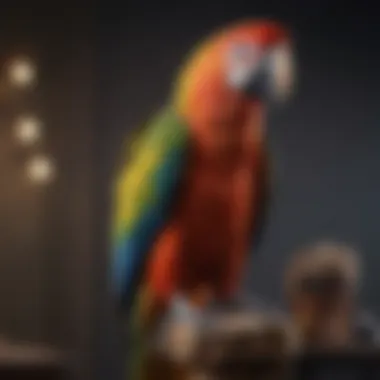
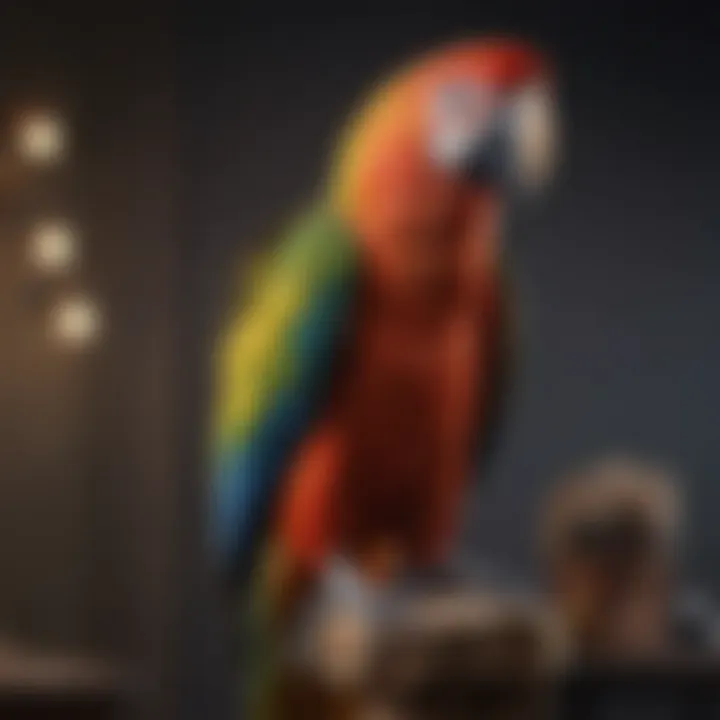
Intro
The world of luxurious pet birds is more than just a hobby; it's a lifestyle that's intertwined with elegance and care. People often delve into bird ownership seeking companionship, yet these feathered friends represent much more. From the exquisite plumage of a Macaw to the vibrant chatter of a Cockatoo, owning a bird can elevate one’s living environment, not just aesthetically but emotionally. Here, we’ll explore the intricacies of keeping such birds, emphasizing the care, understanding, and nutrition they need to thrive. This narrative will serve as a comprehensive guide for both seasoned bird owners and those considering entering the lavish realm of avian companionship.
Care Tips
Caring for luxurious pet birds isn't merely about filling a cage with seeds and water. It requires a structured routine and an attentive mindset, ensuring that the birds feel comfortable, secure, and loved.
Daily Care Routines
Every bird has its unique personality and needs, hence a well-planned daily routine is essential. Each day should include:
- Feeding: Fresh fruits, vegetables, and a high-quality seed mix should be provided daily.
- Social Interaction: Spending time outside the cage for play, or just talking to them, can significantly enhance their mood.
- Observation: Engage with your bird and look for any abnormalities in behavior or eating habits.
Cage Setup and Maintenance
The cage needs to resemble a small sanctuary. It should be spacious enough to allow your bird to stretch its wings and play. When selecting a cage, consider:
- Space: Larger is always better; a suitable size allows for movement and activity.
- Material: Stainless steel cages are recommended, as they are durable and easier to clean.
- Accessories: Include platforms, toys, and perches at different heights to create a stimulating environment.
Cage maintenance is also crucial. Regular cleaning prevents health issues and keeps the bird's space comfortable. Use safe, bird-friendly cleaning agents and make sure to remove droppings daily.
Hygiene and Cleaning Practices
Maintaining good hygiene is pivotal in a bird's wellbeing. Birds are sensitive to their environment:
- Clean food and water dishes daily to prevent bacteria buildup.
- Regularly wash toys with vinegar and water to eliminate germs.
- A monthly deep cleaning of the entire cage should be on the calendar.
Seasonal Care Adjustments
Birds can be sensitive to seasonal changes, requiring adjustments in care:
- Winter: Provide additional warmth, consider using heat lamps if necessary.
- Summer: Ensure fresh water is available, as birds can get dehydrated quickly in the heat.
"Birds in colder climates may require special attention as fluctuations in temperature impact their health."
The key takeaway from care routines is consistency. Keeping a structured schedule not only promotes health but strengthens your bond with your avian friend.
Prolusion to Luxurious Pet Birds
The topic of luxurious pet birds holds a special significance in the realm of pet ownership. These avian companions symbolize not just personal affection, but also a lifestyle steeped in elegance and exclusivity. Owning a luxurious pet bird goes beyond mere companionship; it represents a unique commitment to understanding and catering to the needs of these magnificent creatures.
One crucial element of this narrative is the understanding of what distinguishes a luxury pet bird from traditional pets. Exotic species like macaws, cockatoos, and African greys are not ordinary pets—they demand a different level of care, attention, and respect. The average pet owner may not appreciate the intricacies involved in nurturing such birds, while those who pursue this avian path must be ready to embrace the rewards and responsibilities that come with it.
Benefits of Owning a Luxurious Bird
Owning a luxurious pet bird can bring numerous benefits:
- Emotional Bonding: These birds are often incredibly intelligent and social. Forming a bond with them can lead to rewarding interactions that elevate one’s mood and enhance mental well-being.
- Aesthetic Appeal: From their vibrant feathers to their graceful movements, luxurious birds can bring beauty into any home.
- Enrichment for Owners: The process of caring for such birds—grooming, feeding, and training—offers a fulfilling experience for many owners, who often find joy in their daily routines.
Considerations in Bird Ownership
However, aspiring owners must also navigate some considerations:
- Financial Commitment: Luxurious pet birds come with substantial costs, including high-quality food, ideal cage setups, and routine veterinary care.
- Time Investment: Such birds require substantial time for interaction and mental stimulation. Owners must be ready to invest time to keep their feathered friends happy and engaged.
- Space Requirements: Given their size, behavior, and social nature, luxurious birds need ample space to move around and exercise, making thoughtful space usage essential for a harmonious living environment.
The introduction of luxurious pet birds in this article sets the stage for a deeper exploration into the traits that define these birds, creating a framework for understanding their care and significance in the lives of their owners. As we dive deeper, the exploration will illuminate various facets of avian companionship, addressing their characteristics, their care, the types of species that captivate enthusiasts, and the ethical considerations surrounding their ownership.
Characteristics of Luxury in Pet Bird Ownership
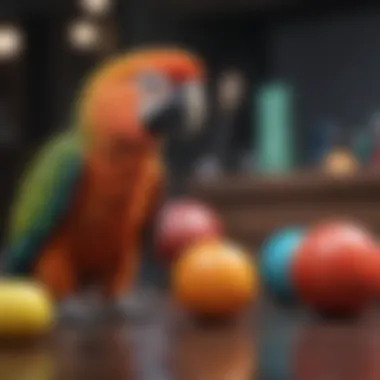
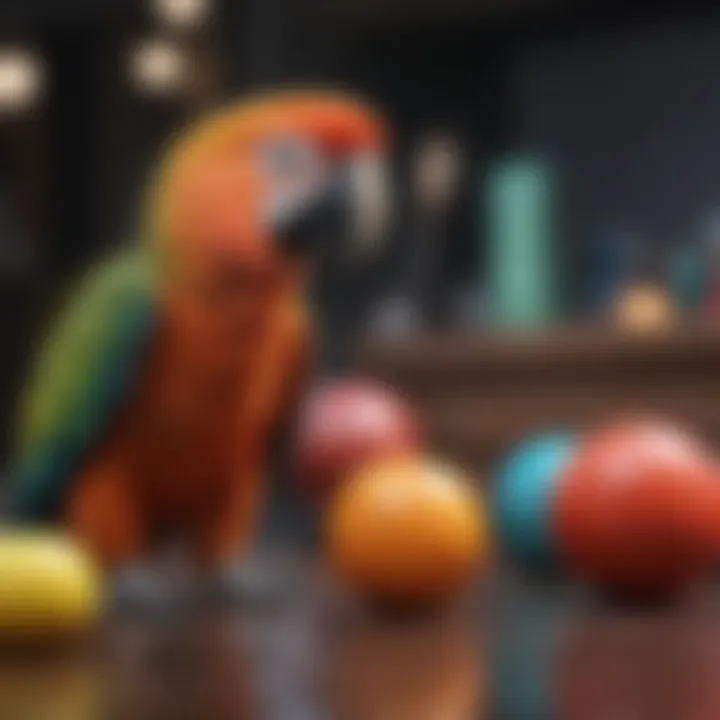
Understanding the characteristics of luxury in pet bird ownership gives insight into what makes the experience not just enjoyable, but exceptional. Luxury here is not merely about spending money but involves a deeper appreciation for the well-being of these feathered companions. This section highlights specific elements that contribute to a luxurious pet bird ownership experience along with the benefits and considerations tied to it.
Defining Luxury in the Context of Avian Companionship
In avian companionship, luxury can be defined through an intricate blend of care, environment, and social interaction. It's quite different from the traditional notion of luxury, which often revolves around opulence or monetary value. For pet bird owners, luxury entails creating an atmosphere where birds can flourish both physically and mentally.
A few aspects that define this luxury include:
- Tailored Living Spaces: The cage or habitat must not only meet basic physical needs but should also encourage natural behavior and activity. Custom-built aviaries, thoughtfully designed for space and safety, become significant elements here.
- Personal Hygiene and Grooming: Regular grooming sessions, including feather preening and nail trimming, reflect a commitment to the bird's well-being, emphasizing that luxury is often found in the details.
- Exquisite Nutrition: Providing high-quality, organic foods tailored to the specific requirements of each species indicates a refined approach to avian care. Shift from basic seed diets to a diverse mix rich in vitamins, minerals, and supplements ensures that birds are nourished comprehensively.
In essence, the luxury here is about elevating the standard of care and devotion that a pet bird receives, transforming mere guardianship into a deeply nurturing relationship.
Psychological and Social Factors
The psychological and social factors involved in luxury pet bird ownership add another layer of complexity to the relationship between owner and bird. Pet birds, being highly social creatures, thrive on interaction and engagement. Understanding this need is crucial to developing a luxurious experience.
- Bonding through Engagement: Interactions like talking, singing, or simple playtime help deepen the bond. Birds can sense their human counterparts' emotions. A luxuriously owned bird often has an owner who is attuned to their needs, spending quality time fostering a connection, thus boosting the bird’s mental health.
- Creating a Stress-Free Environment: Birds can pick up on household dynamics. A peaceful home void of excessive noise or chaos translates to tranquility for the avian companion. This environment becomes fundamental for maintaining their mental well-being.
- Socializing Opportunities: Owners often arrange playdates or interactions with other birds. This not only ensures that the birds maintain a robust social life but enriches their understanding of avian behavior and helps in their cognitive growth.
This relationship and the surrounding environment illustrate that luxury results from the deeply emotional ties rather than just material possessions.
In this realm of bird ownership, the focus is on generating an enriching experience that encompasses physical, mental, and emotional well-being. Through deliberate attention to surroundings and consistent engagement, a fulfilling life for these birds unfolds, making luxury in bird ownership a comprehensive and holistic approach.
Popular Exotic Bird Species
In the realm of luxurious pet birds, choices are vast. Each exotic bird species brings its own flair and uniqueness, attracting enthusiasts and casual pet owners alike. Selecting the right species can influence not only the aesthetic appeal of one's home but also the emotional enrichment and companionship they provide. This section unpacks some of the most sought-after exotic birds, diving into their traits, needs, and the joys they can bring.
Macaws
Macaws are not just brilliantly colorful; they are a symbol of luxury in avian companionship. With their vivid feathers and captivating personalities, they catch the eye of many bird lovers. These birds, hailing from the tropical regions of Central and South America, have a reputation for their intelligence and social nature.
Owning a macaw does come with substantial considerations. They require large cages, plenty of social interaction, and a diet rich in fruits, nuts, and specially formulated pellets. An environment that mimics their natural habitat fosters both happiness and longevity.
"A macaw in full plumage is like having a piece of the rainforest right in your living room."
Caring for a macaw means understanding their need for mental stimulation. Toys, foraging activities, and regular interaction are vital to keeping these birds happy and engaged.
Cockatoos
Cockatoos take the stage with their adorable personalities and stunning crests. These birds often form strong bonds with their owners and showcase their charm through playful antics and vocalizations. Their affectionate nature makes them ideal companions, yet their high intelligence requires diligent care.
When inviting a cockatoo into your life, it is essential to provide a nurturing environment where they can express themselves. These birds enjoy chewing and exploring, meaning that chewable toys and safe, stimulating objects should be at the forefront of their habitat.
Their diet should include a balance of high-quality pellets, fresh vegetables, and small amounts of seeds, ensuring they remain healthy and vibrant.
African Grey Parrots
Known for their incredible cognitive abilities and outstanding mimicry, African Grey Parrots are regarded as some of the most intelligent birds in the avian kingdom. Their unique personalities make them fascinating companions, readily forming close bonds with their owners.
These birds thrive when given an engaging routine that includes games and social interaction. An African Grey's diet should be rich in fruits, vegetables, and high-quality pellets, providing necessary nutrients while keeping their sharp minds occupied.
The need for positive experiences cannot be overstated, as these birds can become stressed when not adequately mentally stimulated. Therefore, an owner with dedication and understanding can create a fulfilling environment for an African Grey to flourish.
Budgerigars and Their Varieties
Often simply called budgies, these petite parrots pack a punch with their vibrant colors and lively personalities. Budgerigars are among the most popular pet birds globally, and for good reason—they are relatively easy to care for, sociable, and come in various colors and patterns.
A budgerigar thrives in an active environment. They require regular interaction and mental stimulation through toys and activities. Their diet, while not overly complex, should consist of high-quality seeds or pellets, along with fresh fruits and vegetables for optimal health.
The variety among budgerigars is astounding, with colors ranging from the traditional green to stunning blues and yellows. This makes them visually appealing in any luxurious setting, adding life and color to a bird owner's home.
Selecting the right exotic bird requires careful consideration but can lead to a rewarding companionship that enriches the lives of humans and birds alike. Each species has its own set of needs and desires, but with the right commitment, the relationship can be incredibly fulfilling.
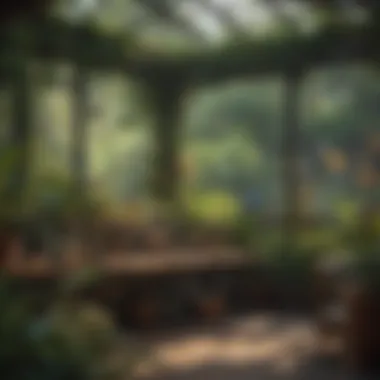

Whether one chooses a flamboyant macaw or a charming budgie, these exotic bird species undeniably add a touch of luxury and vitality to any household.
Caring for Luxurious Pet Birds
Caring for luxurious pet birds is no small potatoes. It is a multifaceted responsibility that reflects the owner's commitment not only to the health of the bird but also to creating an environment that allows these feathered companions to thrive. With their vibrant personalities and unique needs, luxury pet birds frequently become integral parts of their owners' lives, demanding attention and care in a manner that is both rewarding and challenging. The elements that contribute to their care—from their living spaces to their mental stimulation—are crucial for enhancing the overall well-being of these avian creatures.
Creating an Opulent Living Space
When it comes to luxurious pet birds, creating an opulent living space is more than just aesthetics. It means designing an environment that mimics their natural habitat as closely as possible while catering to their luxurious lifestyle.
A few key considerations include:
- Cage Size and Design: A spacious cage is vital for a bird's freedom of movement. Look for a cage that allows full wing spans, which varies significantly based on species. Custom or uniquely designed cages can provide an artistic touch while ensuring functionality.
- Decor and Furnishings: Incorporate natural elements such as branches, perches of varying widths, and even safe plants to create interest and comfort. The decor should not only be visually appealing but also promote natural behavior, like climbing and exploring.
- Lighting and Temperature: Birds require specific lighting conditions that simulate their natural environment. Full-spectrum lights can be helpful to ensure they receive adequate UV exposure, promoting healthy behaviors and overall well-being. Temperature control is also key; a comfortable setting can drastically minimize stress in pet birds.
Ultimately, the environment should serve to enhance their lives while reflecting the essence of luxury. After all, a bird that feels safe and enriched is more likely to develop a strong bond with its owner.
Enrichment and Mental Stimulation
Behind every happy bird, there lies a wealth of mental stimulation and enrichment. These are not mere luxuries; they are essential aspects of keeping a bird properly cared for and content. Birds are smart creatures with curious minds, and without avenues to engage them, they can quickly become bored or distressed.
Consider these enriching activities:
- Toys: Invest in high-quality, varied toys that encourage foraging, problem-solving, and physical activity. Rotate toys regularly to maintain interest and curiosity.
- Social Interaction: Birds thrive on social interaction. Daily lessons or training sessions not only build bonds but also provide mental engagement. Simple tricks like waving or talking can keep their minds sharp.
- Foraging Opportunities: Mimic natural behaviors by hiding treats within toys or around the cage. This challenges them to think and explore, satisfying their instincts.
"Mental stimulation is not just a bonus—it is the backbone of a fulfilling life for a luxury pet bird."
Providing an environment rich in both physical space and mental engagement leads to happier, healthier birds. These animals are companions that thrive in stimulation and attention, emphasizing the important role that their owners play in creating a fulfilling life.
Ultimately, the care of luxurious pet birds is a profound journey that extends beyond mere ownership. It encourages a lifestyle that prioritizes the psychological, social, and environmental needs of these magnificent creatures, dovetailing perfectly with the lavishness they embody.
Nutrition and Diet Considerations
The cornerstone of maintaining a delightful companionship with luxurious pet birds lies in providing them with the right nutrition. Just like any other living beings, birds thrive on diets that support their unique physiology and lifestyle. A careful selection of what goes into their bowls can make the differnece between a vibrant, lively bird and one that’s always under the weather.
High-Quality Diets for Optimal Health
When it comes to luxury pet birds, quality takes precedence over quantity. A high-quality diet can provide the essential nutrients required for optimal health. Premium pellets, such as those made from natural ingredients like seeds, grains, and dried fruits are often preferable. Unlike ordinary pet food, these specialized diets have a balanced nutritional profile, ensuring birds get the right vitamins and minerals.
- Protein Sources: Essential for growth and energy, consider including nuts, legumes, or lean cooked meats in their diet.
- Grains: Whole grains like quinoa or brown rice can serve as an excellent source of carbs, fueling your bird's activity levels.
- Supplementation: Occasionally adding supplements, like omega fatty acids or probiotics, can enhance their health and longevity.
To give your feathered friends the most from their meals, aim for a diet that reflects their natural foraging instincts. Mixing their food offerings encourages exploration and helps combat boredom. Always consult a veterinarian familiar with avian diets to ensure the specific species' needs are met accordingly.
The Importance of Fresh Foods
Now, let’s shift gears and talk about the magic of fresh foods. Just like humans, birds benefit immensely from a diet rich in fresh fruits and vegetables. These items offer not only a burst of flavor but a treasure trove of nutrients.
- Fruits: Berries, apples, pears—most birds can't resist these juicy delights. They are packed with vitamins and also add hydration, which is crucial for certain species, especially in warmer climates.
- Vegetables: Leafy greens like kale or spinach, and colorful peppers can provide much-needed vitamins. They can also be a wonderful source of fiber, promoting healthy digestion.
"The best aviary is one where adequate attention is paid not just to shelter and social needs, but to what goes on the dinner plate."
Fresh food should be offered daily and should be thoroughly washed to remove any pesticide residues. The variety keeps their meals exciting and appetizing. It’s also essential to observe how your birds react to different foods. A little nibble here and there can go a long way in figuring out what delights them.
Health and Wellness Practices
The health and wellness of luxurious pet birds encompass various essential practices that ensure their physical and mental well-being. Understanding these practices is pivotal for pet owners seeking to provide the best possible life for their feathered companions. Just like with any pet, birds also need proper care and attention to thrive long-term. A holistic approach, combining nutrition, regular veterinary visits, and awareness of their behavioral patterns, creates an environment where your avian friends can flourish. This article highlights key health considerations and offers insights into the best practices in avian care.
Routine Veterinary Care
Just as we go for regular health check-ups, our pet birds need that same level of preventive care. Routine veterinary care provides a way to catch potential issues before they develop into serious concerns. Finding a vet who specializes in avian medicine is extremely important. A qualified veterinarian can offer vaccinations, advice on nutrition, and guidance on parasite control tailored specifically for birds.
- Scheduled Check-ups: Regular visits every six months can help keep track of your bird's health. These visits often include:
- Vaccinations: Vaccination schedules vary based on species but can protect against common avian diseases. Always consult with your vet for personalized recommendations.
- Breeding and Reproduction Advice: For those interested in breeding, veterinarians can guide proper reproductive health, ensuring both parents and chicks have optimal conditions for survival.
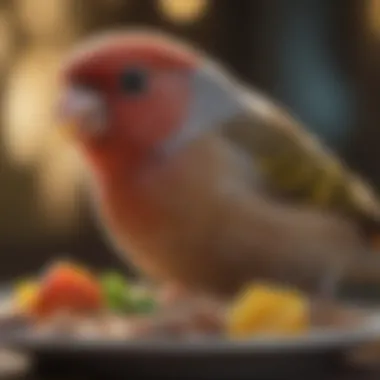
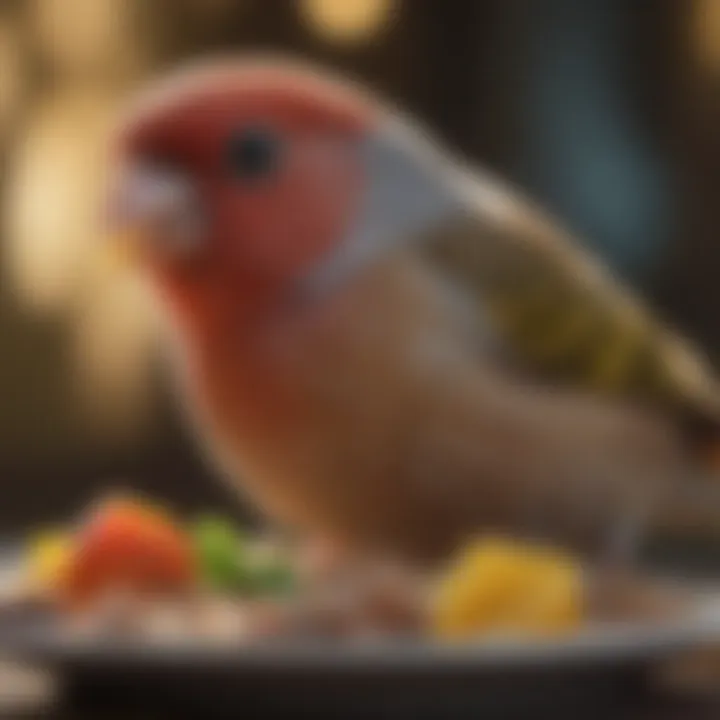
- Physical examinations
- Feather and skin inspections
- Weight checks for any significant changes
Regular care ensures that your pet bird stays in peak health, preventing the need for emergency visits which can be stressful for both the bird and owner. Paying attention to early signs of disease can save both money and heartache.
Recognizing Signs of Illness
Birds can be masters at hiding their discomfort. It’s astonishing how quickly a bird’s demeanor can change when something is wrong. Being vigilant allows you to spot issues before they escalate. Here are some warning signs to keep an eye on:
- Change in Behavior: If your bird suddenly becomes lethargic or less social, it might be a sign that something isn’t quite right.
- Altered Eating Habits: A decreased appetite or not eating at all can indicate health problems. Pay attention to food and water intake.
- Physical Symptoms: Look for changes in droppings—dark, bloody, or excessively watery droppings warrant immediate veterinary attention.
- Feather Condition: Ruffled or dull feathers can be indicators of underlying health issues.
- Breathing Difficulties: If your bird exhibits labored or open-mouth breathing, this is often severe and requires prompt attention.
"An ounce of prevention is worth a pound of cure." By maintaining routine check-ups and being alert to changes in your bird's health, you can significantly elongate its quality and quantity of life. Remember, it’s not just about the basics; the nuanced approaches can make all the difference in providing a luxurious living condition for your avian companions.
Understanding these intricacies leads to not just better care, but a deeper bond with your feathered friend. Better health inevitably translates into a happier, more vibrant pet bird.
Socialization and Interaction
In the realm of luxurious pet birds, socialization and interaction transcend mere companionship. These aspects are vital for cultivating a healthy environment where avian friends can thrive emotionally and physically. While the concept often pivots on bonding with your feathered companions, it enters a broader territory, encompassing their need for social engagement, stimulation, and the development of trust. Birds are inherently social creatures; they flourish in environments that mimic their natural habitats, which often include flocks. Thus, understanding the core of their social instincts becomes crucial for any pet bird owner.
Bonding Techniques
To foster a strong bond with your pet bird, patience and consistent positive interactions are key. Here are actionable bonding techniques that not only help develop a trusting relationship but also enhance your bird’s social skills:
- Daily Interactions: Spend time talking to your bird, using a soft voice to create a calm atmosphere. This helps in reinforcing safety and trust.
- Hand Training: Gradually introduce your hand as a source of comfort. Start by encouraging your bird to step onto your hand for rewards such as treats—this builds trust and encourages handling.
- Playtime: Birds thrive on play. Offer toys that stimulate thought and movement, like swings and puzzle toys. Play is not just fun; it’s an essential learning tool.
- Routine: Birds appreciate structure. Regular feeding, cleaning, and interaction routines help reduce anxiety and create a predictable environment.
Understanding Bird Behavior
A keen observation of your bird's behavior is necessary for effective interaction. Understanding the nuances of avian body language allows you to respond appropriately and measures to ensure their well-being. Here are some behavior traits to keep an eye out for:
- Vocalizations: Different sounds can represent various emotions. For instance, a rapid series of chirps might indicate excitement, while drawn-out calls can express loneliness.
- Body Language: A bird fluffed up may be trying to maintain warmth or display defensiveness. Conversely, a bird that leans toward you with its head up is usually seeking attention and affection.
- Explorative Behavior: Birds that frequently explore and play with their surroundings exhibit curiosity and engagement, which are signs of good health and an enriched environment.
"Socializing your pet bird integrates him or her into the family unit, essential for emotional health, echoing the communal living they experience in the wild."
Recognizing these signals helps tailor your interactions to ensure your bird feels both loved and secure. Make it a habit to engage your bird regularly, observing its responses to enhance that bond even further.
Ethical Considerations in Luxury Bird Ownership
Birds can bring joy and companionship to those who seek a bond with our feathered friends. However, with the beauty of luxury pet birds comes a weighty responsibility, particularly in ethical considerations surrounding their ownership. It’s crucial to shift the focus from mere aesthetics and social status to the well-being of the birds themselves. The implications of our choices resonate far beyond our homes.
The Impact of Avian Trade
The avian trade can be a double-edged sword. On one hand, it fosters global appreciation for exotic species. On the other hand, it can threaten local populations. Many species are put at risk through poaching and habitat destruction. Bird enthusiasts must consider the origins of their pets; for instance, purchasing birds that are bred in captivity rather than captured from the wild can significantly reduce the strain on natural ecosystems.
Furthermore, the legality surrounding avian trade varies greatly by region. It's essential to familiarize oneself with local laws and the regulations imposed by organizations such as the Convention on International Trade in Endangered Species of Wild Fauna and Flora (CITES). This knowledge empowers potential owners to make informed decisions that support sustainability.
"Owning a luxury pet bird is more than just an indulgence; it’s a commitment to their well-being and the environment they come from."
Promoting Animal Welfare
Promoting animal welfare is not just a responsibility; it's a lifestyle that reflects values of compassion and respect. Within the realm of luxury pet birds, this translates into several actionable measures:
- Select Reputable Breeders: Always seek breeders who prioritize the health and happiness of their birds. Responsible breeders follow ethical practices, raising birds in enriched environments and ensuring proper socialization.
- Awareness of Needs: Birds need more than food and water; they require social interaction, mental stimulation, and physical activity. Ensuring your pet bird's needs are met is central to ethical ownership. This means providing an enriching habitat and interactive toys.
- Educating Others: Share your knowledge about ethical bird ownership within your community. Many people are unaware of the responsibility that comes with owning an exotic bird. Raising awareness can encourage others to adopt more ethical practices.
Epilogue
The relationship between humans and their feathered companions transcends mere ownership; it embodies a profound connection steeped in care, responsibility, and emotional fulfillment. In this exploration of luxurious pet birds, understanding this bond becomes crucial, as it not only highlights the intricate needs of these creatures but also reflects on our obligations as owners.
Reflecting on the Relationship Between Humans and Birds
When we think about the companionship that birds offer, it resonates on multiple levels. These beings, often celebrated for their beauty and intelligence, engage us in ways that encourage deeper emotional investments. Cultivating a relationship with a pet bird entails more than just providing food and a cage; it demands an understanding of their social structures, behaviors, and individual personalities. Each species, from the flamboyant Macaw to the inquisitive African Grey, brings its own quirks and demands into its interactions with humans.
The essence of this bond lies in mutual trust and respect. Birds are extremely perceptive to their environments and the emotions of the people around them. For instance, a stressed bird can exhibit changes in behavior, reflecting not only its well-being but also the energy it picks up from its owner. Establishing a nurturing atmosphere can help foster a secure environment for these pets, allowing for effective communication and companionship.
Moreover, understanding avian behavior is paramount. Recognizing signs of happiness or distress helps build a harmonious relationship.
- Social Cues: Birds, much like humans, have a language of their own—body language, vocalizations, and even their specific responses to stimuli. Observing these signals can strengthen the bond.
- Shared Activities: Engaging in activities like training sessions or playtime can boost trust and attachment. Simple things like providing perches or toys could make a significant difference in the way a bird perceives its owner.
In summary, the realm of pet bird ownership is multifaceted and requires a thoughtful approach to nurture a long-lasting relationship built on understanding and empathy. By prioritizing the needs of our feathered friends, we ensure not just their happiness but enrich our lives through companionship that is genuinely fulfilling.















